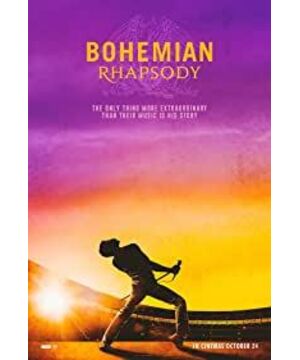"In this world, the only thing crazier than their music is his story"-the trailer for "Bohemian Rhapsody" made such a slogan.
As a music biographical film, it has a good degree of viewing. The actor Rami Malek spares no effort to get close to the interpretation of the role, reproduce the stage performances with sensational effects on the scene, and the ups and downs of life. At the same time, you can easily imagine the reason why it can beat the "Birth of a Star" to become the darling of the Golden Globes (although the latter seems to have few shining points), the label on Freddie Mercury (Freddie Mercury)- —The queer identity of ethnic minorities and bisexuals can better reflect the film’s attention and recognition of diversity than remakes of old films. The free spirit and anti-mainstream pursuit of Queen’s music creation are also in line with Hollywood’s current " The political appeal of "excellent film".
However, the movie itself, it is difficult to deserve the Queen's reputation like the slogan, and it pales in comparison with their music. There has been such a scene in the movie. After the success of "Killer Queen" in 1974, the gold medal producer in EMI’s office hoped that the band could reproduce the brilliant record of the previous work through "follow the formula" (follow the formula), but the band refused. Follow the rules: "we don't follow formulas", they want to innovate and revolutionize, introduce elements of classical opera to seek the fusion and breakthrough of rock music, and thus the iconic song "Bohemian Rhapsody" was born. .
The movie did find a representative song that is enough to summarize the life of Queen’s lead singer Freddie Mercury as the name-"Bohemian Rhapsody", which represents a Mercury attitude towards life and music style, classical , Gorgeous, epic, tender, fancy, metallic, and the desperate passion of life are the products of refusal to be classified as stylized in the golden age of rock music.
Ironically, the movie named after it is as well-regulated and lacking in aura as the commercial product of the assembly line that the Queen ridiculed and disdain. Under the stack of labels of political correctness and diversity, its narrative is smooth and infectious, and it glimpses a glimpse of the iconic events before and after the fame of Mercury and Queen: Indian ethnic origin, tradition The conservative family, first love and marriage, fame and talent, mystery of sexuality and messy life, the disintegration with the band members, and his performances that exhausted his life's last energy are all condensed in these 135 minutes. The director and screenwriter The rhythm is meticulously grasped just right, there is no fault that can be blamed, but there is no surprise at all.
Because of this, the film’s reproduction of the Queen’s growth process and the birth of inspiration for several representative works is full of a kind of knowing certainty, rather than a sense of going deep into its realm. It seems to beat the beat and pluck the strings, "We "will rock you" is easily formed in this way, and the integration of disco style has become a classic.
Under the guidance of such "hindsight" psychological hints and blame for completeness, the film hastily packaged the details of the stage up and down into the quick path to success, thereby eliminating the unknown and fearful adventure experience brought by the growing up. Complex and interesting, the legend that could have been enriched with capillaries seems simple and pale. The life of such a mysterious, legendary, monster and pioneer like Mercury is nested in a classical and neat structural formula, which can almost be seen as a repetition of the clichéd heroic growth and redemption story.
At the beginning of the movie, the Live Aid tour to rescue African refugees in 1985 became the key to life after careful calculation. Taking this as the starting and ending point, the trajectory depicted in the movie dissects the fragile and sensitive heart of Mercuria who is still an Indo-Pakistani boy. A queer soul struggling between family and mainstream values, lost and lonely after becoming famous, his journey of growth and inner salvation often reveal the preaching meaning of new wine in old bottles, but never under the full and glossy mask. Really touched the spirit of Mercury at a special moment.
Like the heroes in the stereotypical growth stories, they lost themselves in prestige and fame, and survived in calculations and criticism. Mercure inevitably betrayed the band members and was imprisoned by the free villain and plunged into the night. Ye Shengge's hesitation and frustration, and finally the shadow of AIDS hung over him.
Therefore, in the movie, the Live Aid tour was portrayed as the most glorious page in Mercury’s life, achieving a reconciliation between him and the band members, and witnessing his being recognized by his family that did not accept him, and the deadly and shameful AIDS. In the struggle, the movie re-interpreted songs such as "Radio Gaga" and "We are the Champion" with great intensity. It seems that at this moment, Mercury's running and singing on the stage are fighting and struggling, reconciling and redeeming. , Find yourself again and regain a new life in the grip of talent and fame.
In order to achieve this shocking effect, the film has advanced the real time (1987) of the diagnosis of AIDS by two full years, thus highlighting the passion and tension of fighting the impermanence of life on the stage with mediocrity and responding to "Live Aid" Loud sound.
Other works by the screenwriter Anthony McCarten will remind us of his familiar formulas: the 2014 Hawking biopic "The Theory of Everything" and the 2017 Churchill biopic "The Darkest Hour", both of which are well-made and solemn. A neat and well-known Oscar nominee for her superb acting skills. The same is true of "Bohemian Rhapsody." Freddy Mercury’s various labels and experiences, talents and sufferings fill him with rewritten materials, wanting to learn from his origin, his race, his In his love and illness, he found the key to unlocking this legendary character. In the more fascinating parts of Mercury, his erratic sexuality, the enjoyment of the carnival, and the sexual tension of stage performance appear in the movie. Very restrained and dull, the lens only stops at Mercure's gaze on the strong man before entering the toilet, and stops at his cruising in the bizarre and sensual places, but has never made a bolder exploration of this.
View more about Bohemian Rhapsody reviews











